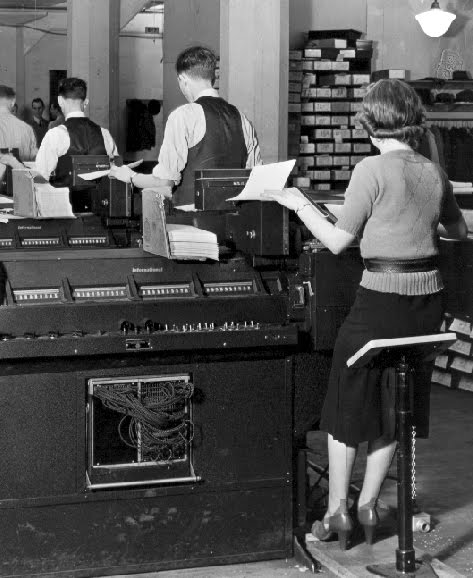
10 Year End Financial and Tax Tips for Your Small Business
As the end of the year approaches, some of us find ourselves overwhelmed by top 10 lists, the shopping masses and endless renditions of Christmas Music. Businesses tend to experience a slowdown, which makes it the perfect time for small business owners to take a closer look at their overall business, financial and tax situation. When you are not buying gifts for your customers, family and friends, a review and analysis of your business will allow you to optimize your current financial situation, implement some beneficial changes that can help avoid last minute tax preparation stress and also prepare for the future.

10 Payment Alternatives to Help Small Businesses Get Paid Faster
One of the numerous ways in which technology has benefitted small businesses has been to increase the number of payment options available. While conventional methods of payment like cash and cheque still exist, there are also a variety of other options like debit cards, internet transfers and mobile payments that have greatly facilitated payment infrastructure and made financial management significantly more flexible. Every business owner must wade through the alternatives and decide what type of payment options are right for their customers. This is based on several factors including their industry, common practices, location and of course business specific considerations. For example, a retailer will usually allow for payment by credit and debit cards, cash and possibly some form of mobile payment. Conversely, a law office may not offer a credit card option, but request payments via cheque or bank transfer.

9 Tips for Building a Sales Forecast
Having a dynamic, regularly updated sales forecast can be essential to the success of a small business. By forecasting your sales revenue you are helping to control for its unpredictability, an inherent risk in any business venture, and prepare for the decisions that are essential to your business profitability. Whether your sales are increasing, decreasing or static, it is always better when decisions are made proactively rather than reactively.
Building your small business sales forecast can be as simple as you want it to be and does not require an accounting degree , particularly when your business is in the early and/or startup stages. Below are some tips to help you create your sales forecast:

13 Ways an Effective Accounting System Can Improve Business Decisions
An accounting system can be an extremely powerful tool for business owners. When structured with the specific needs of the business in mind, it has the power (through the magic of debits and credits) to convert data into a format that tells an interactive, completely personalized story about your business. By providing feedback on how your business is doing it allows you to understand its strengths and weaknesses which ultimately helps you to improve profitability, cash flow and growth of your business.

How to Account for Bad Debts and Record it in Quickbooks Online and Desktop
One of the more unpleasant aspects of being a business owner is having to chase clients that do not pay. It is frustrating, stressful and disheartening, while attempts to collect are an unproductive use of time and can have a significant impact on cash flow, particularly if you are unprepared. A bad debt, in accounting terms, refers to an amount charged to a customer that is never paid. While the original sale would have been reflected as revenue, the uncollectible bad debt would then have to be written off as a separate line item on the profit and loss statement

How to determine if your business idea Is profitable
I have spoken to and mentored many lovely entrepreneurs who have wonderfully innovative ideas for a new business. But, as any business owner can attest to, starting a new business is hard work. Before even thinking about launching, you need to ensure that the business is actually viable. You do this by assessing your market, reviewing potential demand for your product and analyzing the competition. Once you have done this, you then need to ensure that your business can be profitable.
In order to determine profitability, you need to understand both the pricing of your products and/or services and the relevant costs. This can be difficult to do especially when you don’t have any history. Your only choice is to estimate based on the best information available. In this article, I give you some guidance on the financial information that you need to compile.

Improve Your Small Business Cash Flow with These 10 Tips
One of the biggest challenges for many small business owners, particularly in the initial and growth stage, is ensuring that they maintain sufficient cash flow. Many businesses with great potential have suffered an untimely demise due to their inability to pay their suppliers, employees and revenue agencies. In many cases, this can be prevented through a better understanding of your small business’ cash flow requirements and making sure that you implement relevant processes that can handle cash flow issues as they arise.

4 Simple Financial Metrics to Help Measure the Success of Your Small Business
Most small business owners want insights into their business performance to get a sense of what they are doing well while also trying to understand their areas of weakness. Unfortunately a big picture view does not always immediately reveal itself– a thorough understanding of your business generally requires a more thorough analysis and introspection. You may be tempted to look at cash (or lack thereof) in your bank account or your net profit , however these are not always reliable indicators of success or failure , particularly when taken in isolation. Every small business owner should identify the specific needs and constraints of their business to determine the optimal analysis required to assess its financial performance. Some general analysis that most businesses can benefit from are presented below:

Why a Separate Bank Account is Essential for Your Small Business
If you are self employed or a small business owner taking care of your own accounting and business finances, you have probably discovered that this can be time consuming and occasionally frustrating. It can sometimes be difficult to know if you are doing things correctly. Consequently, you procrastinate, which makes things worse at year end or tax time. To combat the problem it is important to have tools in place to facilitate the process and make it less painful, which could include accounting software and/or a bookkeeper as well as a good organization system for your documents, whether you have a paperless office or a manual filing system. Another very simple measure that you can take is to have a separate bank and credit card account for your business.

What is your Net Worth?
There comes a point in many people's lives when they want to find out what they are worth. This is much more difficult to quantify on a metaphysical level; however on a tangible level most people can figure out how much wealth they have created over time. The definition of net worth is simply the total of all your assets (what you own) less your liabilities (what you owe).

How to Prepare a Business Budget
One of the primary challenges facing a small business owner is uncertainty about the future. (It is also what makes entrepreneurship exciting). We may have an amazing product or service, but we can’t be sure whether this will actually translate into a profitable business model. A budget is an excellent tool to manage uncertainty and, contrary to popular belief, can actually be fairly straightforward to prepare, particularly for small businesses that do not have to worry about different departments, product lines and geographic areas .
A budget, very simply, is a tool that helps you predict your sales, expenses and profitability as well as your cash flow needs. It is based on estimates, which in turn are based on a combination of experience, history and industry knowledge. In terms of presentation, a budget should essentially mirror your financial statements and will include the following main categories:

Investment Strategies for Your Incorporated Small Business
One of the benefits of having an incorporated small business is that after paying yourself a salary or dividend any excess funds can be invested directly through the corporation. Since small businesses often cannot predict how their business will perform from year to year, the ability to retain funds in the corporation allows for a cushion to smooth out fluctuations in earnings which can then be paid out in lower performing years. By keeping the funds in the corporation, the business is able to defer tax since usually the small business tax rate is lower than the personal tax rate. Some points to consider:

7 Reasons Why Debt is Good for Your Business
Debt is often perceived negatively. Debt can be “evil”, “crippling” and an “unforgiving master”( the last one from the Google query “Debt is…”;). It suggests a lack of sufficient cash flow and an inability to fulfil your funding requirements. It also an indication of increased risk, as if you are unable to service your debt repayments, it could have dire consequences for your business (see American Apparel). There is however another side to debt. The majority of large corporations have some level of debt. It can be a great way for individuals to earn a return on their investment. And of course it is an integral part of the engine that drives the world economy. For small business owners, debt can actually provide some great benefits as long as it is managed responsibly. Some of these are discussed below:

4 Metrics to Help Improve Your Small Business Cash Flow
n a recent study by TD Bank Financial Group it was determined that one of the primary challenges facing small business was cash flow (The other two were managing clients and government red tape). This probably comes as no surprise to most small business owners, especially in the early stages. The simple answer to this problem would be a limitless source of cash. Since this is usually not possible, we need to do the next best thing: analyze our cash flow requirements and find the most cost effective and easily available solution for any shortfalls. Even the most successful business can find itself shutting its doors if it is not able to manage it's cash flow needs.
Below are 4 financial metrics, which if understood and monitored regularly, can actually help improve your business' cash flow:
5 Notable Disclosures in Groupon’s Financial Statements and What They Mean.
Since Groupon first submitted its S-1 filing in June, 2011, there has been a wave of negative sentiment around Groupon’s upcoming IPO. Many analysts believe that not only is Groupon not a good investment at the approximate $20 Billion + that its IPO’s initial share price will value it at, but is in fact on the brink of insolvency. They are also some that do not believe that, in the long run, Groupon’s business model is profitable .
In an effort to determine whether Groupon is in fact a raging buy or, as alternatively presented, on the verge of insolvency, I have undertaken an analysis of their latest S-1 , which was filed with the SEC on August 10, 2011. The document, which is required by all companies who want to file an initial public offering, comprehensively reviews its operations, long term viability, business risks (which are numerous) and its financial condition. Some of the more interesting discoveries, as they relate to the 6 months ending June 30, 2011, are presented below:
